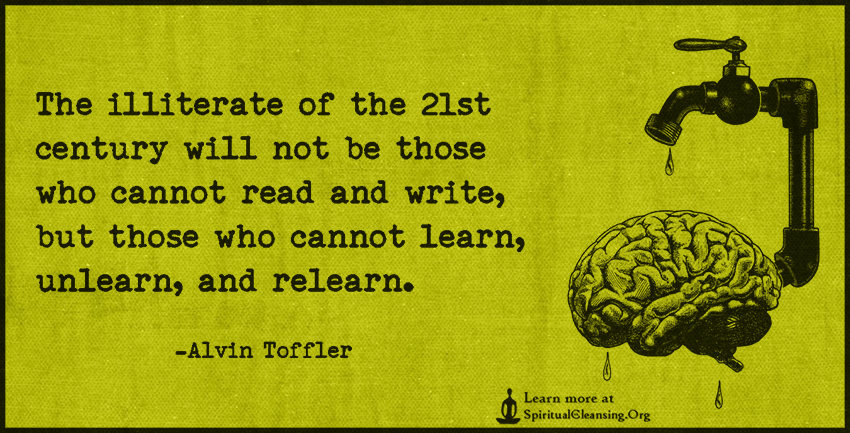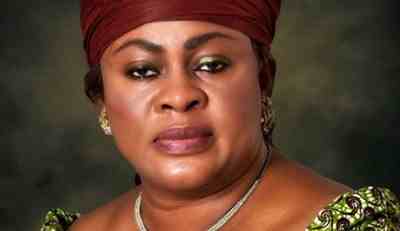In his book, “The Third Wave”, Alvin Toffler tells us who the illiterate people of today are. According to him, “the illiterate men of the 21st century will not be those who cannot read and write but those who cannot LEARN, UNLEARN and RELEARN.” Thus, the answer to the question is simply that if an individual cannot learn, unlearn and relearn in today’s world, regardless of the number of degrees and diplomas, s/he is an illiterate!
Illiteracy, meaning having little or no education, is rife in our society and we have a good number of “educated” bigots who cannot unlearn the prejudices they have been filled with and relearn afresh. With today’s reality, one would fully agree that “effectively, we are in the season of illiteracy”, as Reuben Abati wrote his The Guardian article of May 4, 2001 (p. 43) during those good old days.
The crises and problems facing Nigeria, as a microcosm of the world, are rooted in this illiteracy. We have learnt so much but we have not unlearnt the wrong things we have accepted as a fait accompli. We have all been fed with lies by mind manipulators that we hold pervert opinions and wickedly negative views of one another, which all result in strife, tension and conflict enveloping the world.
Malcolm X, the American civil rights leader, said: “If you are not careful, the newspapers will have you hating the people who are being oppressed, and loving the people who are doing the oppressing.” What he said of newspapers applies to television and all the traditional and new media.
One of the things I used to enjoy was reading people’s reactions and comments to news and articles on popular news sites. I stopped at a stage because of the nauseating level of crass illiteracy displayed by many of the commentators. The depravity of the commentators is often appalling.
Rather than address issues, our 21st century illiterates are character assassins. The cyber attackers don’t just attack opinions, they attack personalities, their ethnic groups, their religions and traditions. The illiterates fight foul making the blogosphere a stinking dumpsite of jaundiced opinions expressed in banal language.
The reality is that virtually all our ethnic groups have various ways of denigrating others. However, the essence of good education is to break away from such traits and unlearn our ethnic chauvinisms. There was a fatal accident involving an articulated lorry and a commercial vehicle on Ilorin-Ogbomoso road a few years ago. The person who told us in Ilorin said it was a tragic accident that claimed seven lives…and three Malas (Mallams). To him, the Malas were sub-human, so their death was an after-thought, and certainly not part of the original number!
One of the most common errors of reasoning is generalisation. Everyone has heard such sweeping generalisations as “the Hausa are aggressive”, “the Igbo are materialistic” and “Yoruba are disloyal”. If you ask the illiterates who peddle such things how many of the people they generally label they had interacted with, they would guffaw and be open-mouthed, usually.
Even intra-ethnic animosities exist without any empirical reason. Among the Yoruba, the Ibadan are characterised proverbially and the Lagosians are labeled. The Ijebu are not spared just as the Ilorin are tackled. We have been fed with all these noodles of lies and we have attitudes and prejudices that shape our relationships, including marriages. We have to unlearn all this rubbish and clear our hearts and heads of mental cobwebs.
We have people who have created an industry out of lampooning adherents of other religions. Islam, to cite a single example, has been called all sorts of names by those who haven’t the faintest idea about it. Huge investments have been committed to giving it a bad name perhaps because it is the fastest growing religion in Europe and America. The agenda is to stoke violence and set people against one another.
The need of the day is that we must reject the arm-chair dichotomisation of people into good guys and bad guys. No one people are all good; no people are all bad. As a people, more than at any other time, we need to exercise restraint, show education, embrace moderation and avoid the tendency of painting all people with a single brush. It is only illiterates who do so.
I was before an American class some few years ago at Governors State University, Illinois. I displayed a big map of the world on the white board and pointing to different parts of the world, I asked the graduate class their feelings. The Chinese are these; the Arabs are that; the Russians are bla bla, they all said. I was shocked when I pointed at Africa and they chorused “HIV/AIDS”. I was only expecting to hear corruption!
I asked the class how many of them had been to the places and people they were quick to lampoon and judge negatively. None of them had stepped out of the US. I then reinforced the theory of phenomenology I was illustrating and the need to relearn and unlearn part of what books, media and movies were making us to believe. We then agreed that knowledge is conscious.
In phenomenology, a philosophical and communication theory, human beings only come to understand the world through their direct experiences. The actual lived experience is the basis of reality as there is no reality without experiencing it. The basic principles of phenomenology are three: (a) knowledge is conscious; it is not inferred, it is directly found; (b) the meaning of a thing is made of the potential of the thing in one’s life and (c) language is the vehicle of meaning.
We have allowed divisive politics and religious bigotry to divide us so far that the young ones are becoming increasingly unable to differentiate between right and wrong. We have digested much intellectual rubbish like life being for “the survival of the fittest” (Charles Darwin) and that “the end justifies the means” (Niccoló Machiavelli) to rationalise the most heinous and despicable. Examples are legion.
However, life is not just for the survival of the fittest but of all since everyone has a role to play. The end also does not justify the means, it is the means that justifies the end and no one should be under the illusion that any evil done by man to man will go unpunished, if not now, surely later, to paraphrase the late Dele Giwa.
It is high time Nigerians learnt, relearnt and unlearnt, the need for which is resonant in the words of Gotthold Ephraim Lessing: “There are good men in every land; the tree of life has many branches and roots; let not the topmost twig presume to think that it alone has sprung from the mother earth; we did not choose our races by ourselves; Jews, Muslims, Christians all alike are men; let me hope I have found in you a man.”
Who are the 21st century illiterates?






Sir, the page is not found
View CommentPlease check again.
View CommentAlright sir
View CommentI just noticed it too. It will be fixed. Martins Cole, Jeleelah Iromini
View CommentLink fixed sir.
View CommentStill not found sir
View CommentPlease check again.
View CommentIt’s going through now sir
View CommentError 404
View CommentPlease check again
View CommentAlright sir
View CommentSame here, sir.
View CommentPlease check again.
View CommentJust read the piece. It calls for illumined action for a better society. May God bless you richly for this, sir.
View CommentAmen! God bless you too.
View CommentLink fixed, apologies.
View CommentThis is an eye opener for all. The inability to unlearn ignorance has made many to go blind. It has destroyed the unity that should be enjoyed in humanity.
One of the blessings I received today, is having the opportunity to read and digest this wonderful piece from a Don. It’s a mind opening article to those who have the opportunity to read, and comprehend.
View CommentMay Allah swt reward you in abundance. Thank you very much sir
#MindWideOpen
Thought provoking and inspiring. …thank you sir ……
View CommentThis is an example of articles that always inspire me to sustain my upright thinking and reflect. I don’t know how I can describe this, it exceeds words…. I pray soon, I can write like this!
More power to your elbow!
View CommentThis is a reality. God will continue to enrich your knowledge,sir.
View CommentSincerely am dumbfounded! Your way of analyzing issues sir is really incomparable and very rare among it’s likes. You are indeed a gem!
View CommentWhat an interesting, award-winning and life-changing write-up there! You just provided working solutions to age-long problems facing the world and humanity In general irrespective of colour, shape, race, tribe, religion etc.
View CommentKudos to you and I doff my hat for you sir.